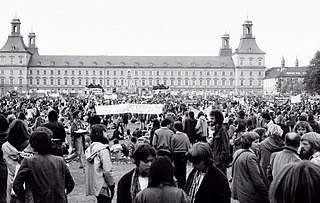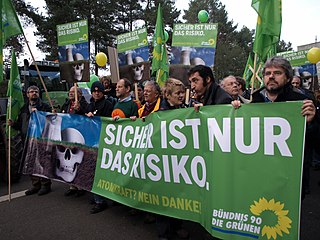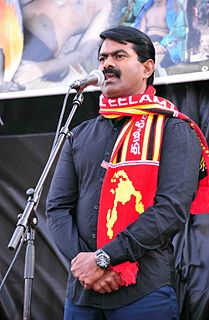Related Research Articles

Tamil Nadu is a state in southern India. Its capital and largest city is Chennai. Tamil Nadu lies in the southernmost part of the Indian subcontinent and is bordered by the union territory of Puducherry and the South Indian states of Kerala, Karnataka, and Andhra Pradesh. It is bounded by the Eastern Ghats on the north, by the Nilgiri Mountains, the Meghamalai Hills, and Kerala on the west, by the Bay of Bengal in the east, by the Gulf of Mannar and the Palk Strait on the southeast, and by the Indian Ocean on the south. The state shares a maritime border with the nation of Sri Lanka. Its official language is Tamil, which is one of the longest-surviving classical languages in the world.

Muthuvel Karunanidhi Stalin ( is an Indian politician serving as the 8th and current Chief Minister of Tamil Nadu.

Reliance Infrastructure Limited (R-Infra), formerly Reliance Energy Limited (REL) and Bombay Suburban Electric Supply (BSES), is an Indian private sector enterprise involved in power generation, infrastructure, construction and defence. It is part of the Reliance Anil Dhirubhai Ambani Group. The company is headed by its Chairman, Anil Ambani, and Chief Executive Officer, Punit Narendra Garg. The corporate headquarters is in Navi Mumbai. Reliance Infrastructure's interests are in the fields of power plants, metro rail, airports, bridges, toll roads, and defence. It is a major shareholder in the other group company, Reliance Power and Reliance Naval and Engineering Limited.

The anti-nuclear movement is a social movement that opposes various nuclear technologies. Some direct action groups, environmental movements, and professional organisations have identified themselves with the movement at the local, national, or international level. Major anti-nuclear groups include Campaign for Nuclear Disarmament, Friends of the Earth, Greenpeace, International Physicians for the Prevention of Nuclear War, Peace Action and the Nuclear Information and Resource Service. The initial objective of the movement was nuclear disarmament, though since the late 1960s opposition has included the use of nuclear power. Many anti-nuclear groups oppose both nuclear power and nuclear weapons. The formation of green parties in the 1970s and 1980s was often a direct result of anti-nuclear politics.
Kudankulam is a town in the Tirunelveli district in Tamil Nadu, India. It is 20 km northeast of Kanyakumari, 30 km from Nagercoil, 70 km from Tirunelveli and about 105 km from Thiruvananthapuram.

Kudankulam Nuclear Power Plant is the largest nuclear power station in India, situated in Kudankulam in the Tirunelveli district of the southern Indian state of Tamil Nadu. Construction on the plant began on 31 March 2002, but faced several delays due to opposition from local fishermen. KKNPP is scheduled to have six VVER-1000 reactors built in collaboration with Atomstroyexport, the Russian state company and Nuclear Power Corporation of India Limited (NPCIL), with an installed capacity of 6,000 MW of electricity.

Nuclear power is the fifth-largest source of electricity in India after coal, gas, hydroelectricity and wind power. As of November 2020, India has 23 nuclear reactors in operation in 7 nuclear power plants, with a total installed capacity of 7,480 MW. Nuclear power produced a total of 43 TWh in 2020-21, contributing 3.11% of total power generation in India. 10 more reactors are under construction with a combined generation capacity of 8,000 MW.

The anti-nuclear movement in Germany has a long history dating back to the early 1970s when large demonstrations prevented the construction of a nuclear plant at Wyhl. The Wyhl protests were an example of a local community challenging the nuclear industry through a strategy of direct action and civil disobedience. Police were accused of using unnecessarily violent means. Anti-nuclear success at Wyhl inspired nuclear opposition throughout Germany, in other parts of Europe, and in North America. A few years later protests raised against the NATO Double-Track Decision in Germany and were followed by the foundation of the Green party.

Senthamizhan Seeman is an Indian politician, filmmaker, Tamil Nationalist ideologue and the chief-coordinator of the political party Naam Tamilar Katchi in Tamil Nadu. He is an advocate of the creation of vote bank for Tamils.

Sterlite Copper is a subsidiary of Sterlite industries, a company owned by Vedanta Limited.

In the 1970s, an anti-nuclear movement in France, consisting of citizens' groups and political action committees, emerged. Between 1975 and 1977, some 175,000 people protested against nuclear power in ten demonstrations.

Anti-nuclear protests began on a small scale in the U.S. as early as 1946 in response to Operation Crossroads. Large scale anti-nuclear protests first emerged in the mid-1950s in Japan in the wake of the March 1954 Lucky Dragon Incident. August 1955 saw the first meeting of the World Conference against Atomic and Hydrogen Bombs, which had around 3,000 participants from Japan and other nations. Protests began in Britain in the late 1950s and early 1960s. In the United Kingdom, the first Aldermaston March, organised by the Campaign for Nuclear Disarmament, took place in 1958. In 1961, at the height of the Cold War, about 50,000 women brought together by Women Strike for Peace marched in 60 cities in the United States to demonstrate against nuclear weapons. In 1964, Peace Marches in several Australian capital cities featured "Ban the Bomb" placards.
Jaitapur Nuclear Power Project is a proposed nuclear power plant in India. If built, it would be the largest nuclear power generating station in the world by net generation capacity, at 9,900 MW. The power project is proposed by Nuclear Power Corporation of India (NPCIL) and would be built at Madban village of Ratnagiri district in Maharashtra.
S. P. Udayakumar is a writer and anti-nuclear activist from Tamil Nadu, India. He is the convenor of the People's Movement Against Nuclear Energy (PMANE), which is protesting against the Kudankulam Nuclear Power Plant project.
Poovulagin Nanbargal is an environmental organisation based in Tamil Nadu, India. It spearheaded a legal battle against Kudankulam Nuclear Power Plant.

Thoothukudi Massacre denotes events that took place on 22 and 23 May 2018 in Thoothukudi, Tamil Nadu, India. The violence took place during an ongoing protest against proposed expansion of a copper smelter plant run by Sterlite Corporation in Thoothukudi town. Police opened fire on the protesters, killed 13 people and left 102 injured. Several policemen were also injured during the protests.

M. K. Stalin ministry, is the Council of Ministers headed by M. K. Stalin that was formed after the DMK won the 2021 Tamil Nadu Legislative Assembly elections. The Council assumed office on 7 May 2021. The ministry had a total of 34 ministers in the Cabinet at the time of swearing in compared to 30 ministers in the previous government. M. K. Stalin sworn in as 21st Chief Minister of Tamil Nadu, 8th person to hold this position.

Kootapuli is a small coastal village in Radhapuram taluk, Tirunelveli district, Tamil Nadu, India. Kootapuli is close to the Koodankulam Nuclear Power Plant.
References
- ↑ Dutt, Nidhi (22 November 2011). "India faces people power against nuclear power". BBC News.
- ↑ Kaur, Raminder (9 July 2012). "Nuclear power vs. people power". Bulletin of the Atomic Scientists.
- ↑ "Cops clash with villagers near Kudankulam site". Business Standard. 10 September 2012. Retrieved 6 December 2013.
- ↑ "Kudankulam nuclear plant: Police lathicharge protesters". The Times of India . 10 September 2012. Archived from the original on 1 November 2012. Retrieved 6 December 2013.